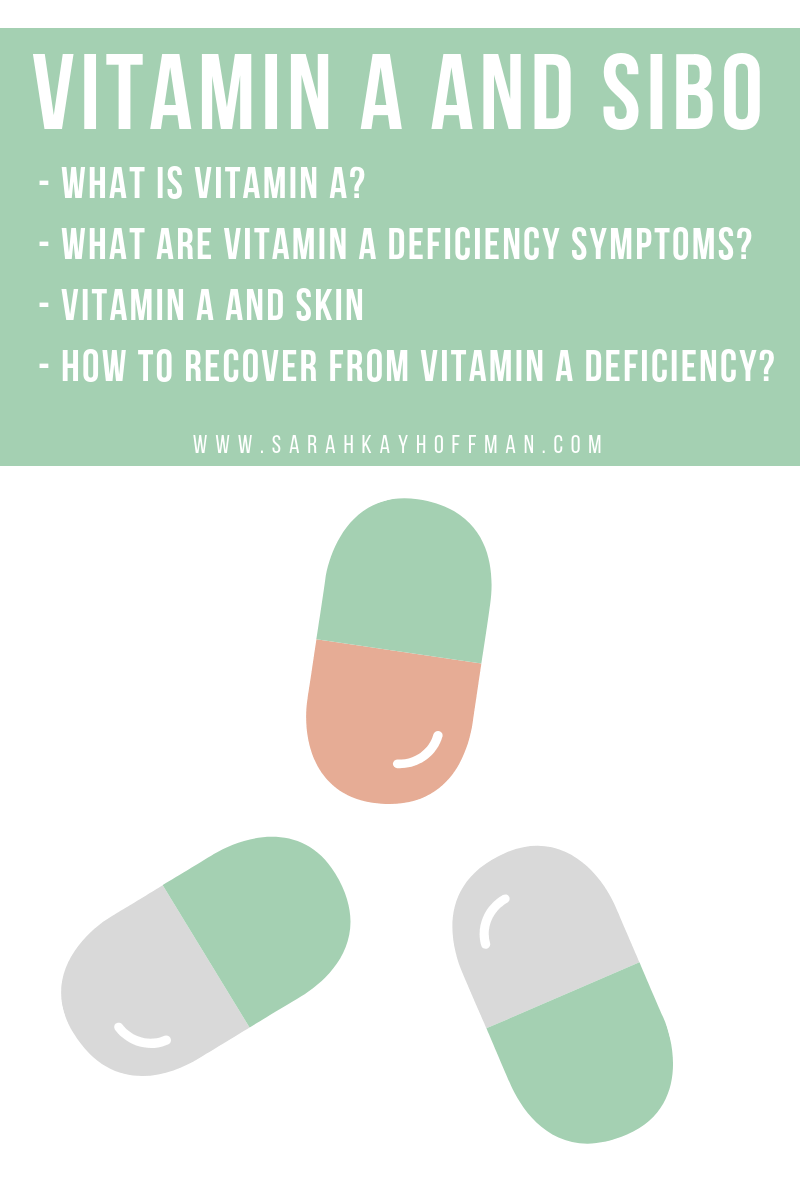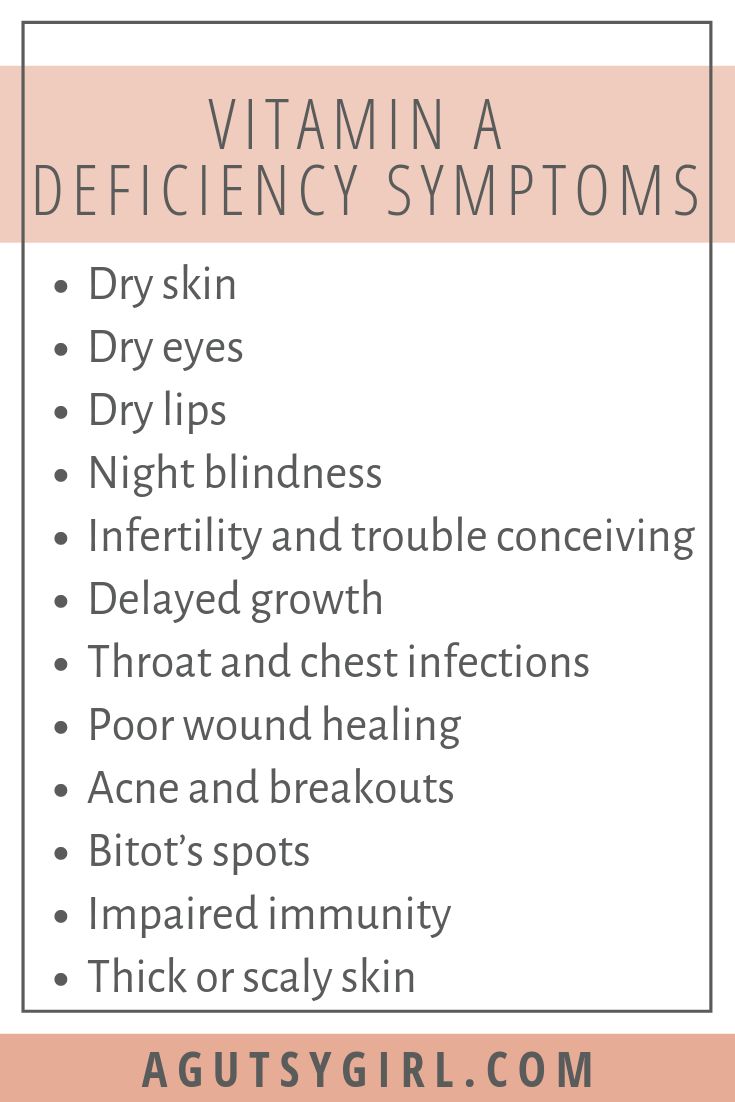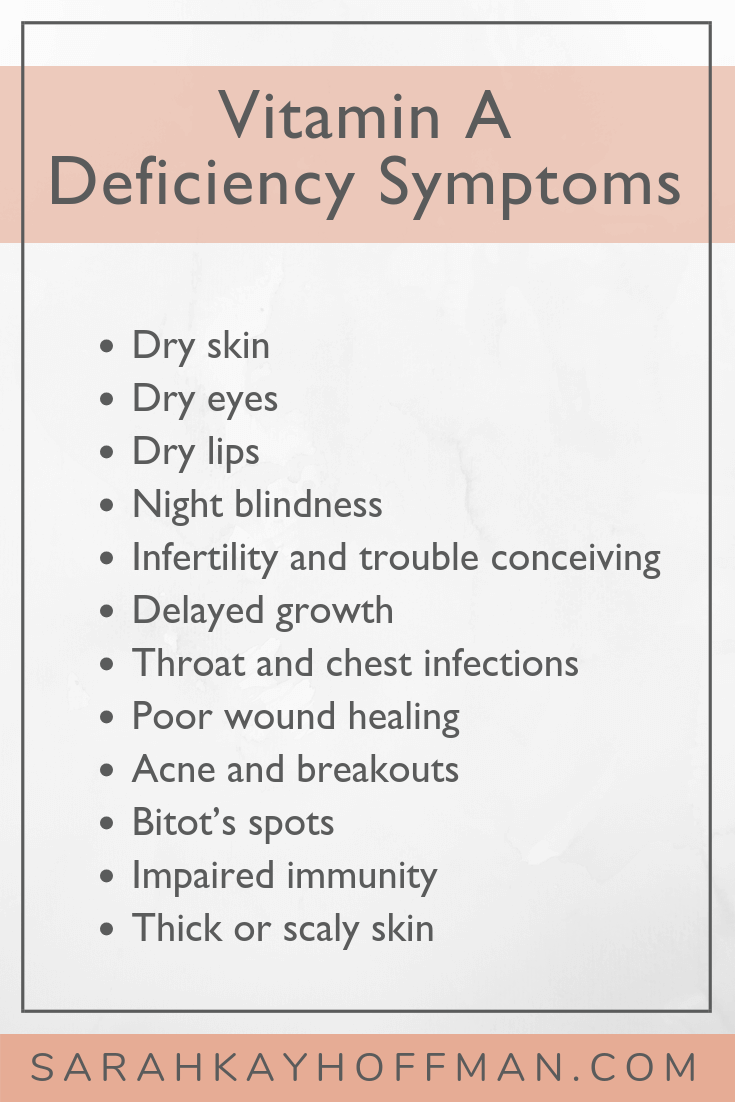The second post in the Micronutrients and Macronutrients with SIBO series is Vitamin A and SIBO.
In case you missed the first post, you can grab Vitamin B12 and SIBO HERE.
Vitamin A and SIBO
Click HERE to save this post for later.

Vitamin A is not necessarily directly correlated with SIBO (as it’s known more for its role in skin health), but it is definitely indirectly correlated with SIBO because SIBO tends to rob us of all Vitamins and nutrients.
Vitamin A is no exception.
In June of 2018 when I was living in SIBO h#$% I was borderline deficient in Vitamin A. Nothing major, yet it makes sense that I tip-toed the line because both my gut and cystic back acne were a hot mess.
What is Vitamin A?
Vitamin A, or retinol, is one of the most widely acknowledged nutrients for healthy skin. Synthetic retinoids have been used as effective treatments for severe acne and psoriasis since the 1980s, demonstrating how useful vitamin A can be in treating problem skin.
Vitamin A influences the physiology of the skin by promoting epidermal differentiation, modulating dermal growth factors, inhibiting sebaceous gland activity, and suppressing androgen formation.[12] As it promotes cell turnover in the skin, vitamin A is effective in preventing the formation of comedones that cause the most common forms of acne. (taken from Chris Kresser’s ADAPT program)
The Mayo Clinic simply states, “Vitamin A (retinol, retinoic acid) is a nutrient important to vision, growth, cell division, reproduction and immunity.”
What are Vitamin A deficiency symptoms?
Click HERE to save these for later.

Here are some Vitamin A deficiency symptoms:
- Dry skin
- Night blindness
- Dry eyes
- Infertility and trouble conceiving
- Delayed growth
- Dry lips
- Throat and chest infections
- Poor wound healing
- Acne and breakouts
- Bitot’s spots
- Impaired immunity
- Thick or scaly skin
(Sources: Healthline, Dr. Axe)
Vitamin A and Skin
“Lack of vitamin A causes the skin to become keratinized and scaly, and mucus secretion is suppressed.[13] Rough, dry skin is a common sign of vitamin A deficiency, which often first appears as rough, raised bumps on the back of the arms.[14] This condition is called hyperkeratosis pilaris and is found in approximately 40 percent of adults.[15] Though dermatologists believe this is an inherited condition with no cure, I have successfully treated this condition in several patients by significantly increasing their consumption of vitamin A-rich foods. While physicians prescribe synthetic retinoids to treat skin conditions including acne, eczema, psoriasis, cold sores, wounds, burns, sunburn, and ichthyosis, it is possible to obtain similar effects from consuming natural sources of preformed vitamin A.
A variety of traditional foods contain preformed Vitamin A. The body absorbs it well. The most vitamin A-rich foods are liver and cod liver oil, but other sources include kidney, cream and butter from pastured cows, and egg yolks from pastured chickens. I recommend using cod liver oil, as this provides a balance of vitamin A and vitamin D that will reduce the risk of overdosing on vitamin A. Eating liver once or twice per week is a great dietary strategy to reduce and even eliminate stubborn acne.”
(Chris Kresser via his ADAPT program)
How to recover from Vitamin A deficiency?
Per the above, Chris Kresser mentioned that the most Vitamin A-rich foods include:
- liver (try THIS meatball recipe!)
- cod liver oil
- kidney, cream and butter from pastured cows
- egg yolks from pastured chickens (read: Incredible Egg Yolk)
Other Vitamin A-rich foods include:
- carrots
- sweet potatoes
- winter squash
- cantaloupe
- apricots
- spinach, kale, and collard greens (get those greens!)
- Some spices are also high in vitamin A, including paprika, red pepper, cayenne, and chili powder.
You can also supplement with Vitamin A. I use the Seeking Health Vitamin A liquid drops, a recommendation from Liz Wolfe, and started using it when my cystic acne was awful last spring. To this day I use it.
ps. For dry facial skin, I just bought (and used for the first time last night), the Cleansing Balm. The product description says, “100% of women showed a significant increase in skin hydration after eight hours, with an average increase of 25%.” I had been hearing people who have dry skin rave about it, so I finally took the plunge. I can attest to the instant hydration. Incredible!
How are your vitamin A levels? I’d love to hear from you.
If you liked this post, you might also like:
Xox,
SKH
Read all posts from this series:

🤰 bloating be gone! weight loss through optimal gut health for women
💃ʜᴇᴀʟ ʏᴏᴜʀ ɢᴜᴛ. ʜᴇᴀʟ ʏᴏᴜʀ ʟɪfe.
🫶🏻 founder gutbyome.com







A probiotic may work for dry skin by reducing phenols — which are high in some fruits, veggies and are produced by certain gut bacteria.
https://www.ncbi.nlm.nih.gov/pmc/articles/PMC4965514/